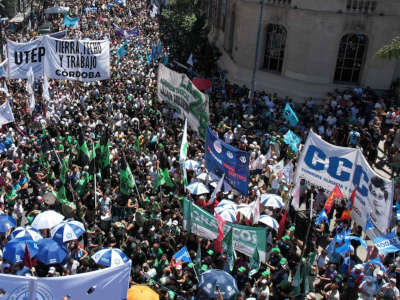Milei’s honeymoon with the Argentine masses — if he had one — came to an abrupt end on Jan. 24. Argentina’s union movement called a general strike that day. Tens of thousands of workers took to the streets in Buenos Aires and each of Argentina’s major cities. Hundreds of thousands more participated in the strike, and thousands in many world capitals held solidarity actions.
Hundreds of thousands of workers protest the new president in Argentina. Buenos Aires, Jan. 25, 2024.The call to strike was made by the General Confederation of Labor (CGT), an umbrella organization larger than any other union or union federation in the country. At times, its leadership has represented the interest of the workers. At other times, its leaders have collaborated with neoliberal administrations and cut deals in the interests of the ruling class.
But, in this instance, the CGT has placed itself firmly on the side of the workers in its unwavering opposition to Milei and his disastrous so-called “reforms.”
Many in the opposition to Milei have condemned the strike, even though it was called with the hope of blocking Milei’s war on the workers. From the anti-Milei Peronist coalition to the smaller capitalists who are most threatened by Milei’s policies, the élites of Argentina have demanded the CGT cease striking. (Peronist refers to the political tendencies identified with late Argentine President Juan Peron.)
This is a textbook example of how contradicting interests within the bourgeoisie can temporarily come together. Even when they disagree, no portion of the ruling class sincerely wants to empower the people — and certainly not the working class.
Yes, large swaths of the capitalist class oppose Milei, while other portions fervently support him, but they are all in accord that a united working class expressing solidarity and exercising its strength is forbidden. Nevertheless, the will of the people cannot be held back forever. Even a united ruling class cannot easily impose its will on a united and combative working class.
[…]
As always, supporting the free market means more freedom for corporations to exploit, not freedom for the workers themselves.
(Emphasis original.)
This is a textbook example of how contradicting interests within the bourgeoisie can temporarily come together. Even when they disagree, no portion of the ruling class sincerely wants to empower the people — and certainly not the working class.
The bourgeoisie are highly centralized, thus it is necessary for the proletariat to be highly centralized to be able to combat against capitalist dictators and to succeed in revolution.



